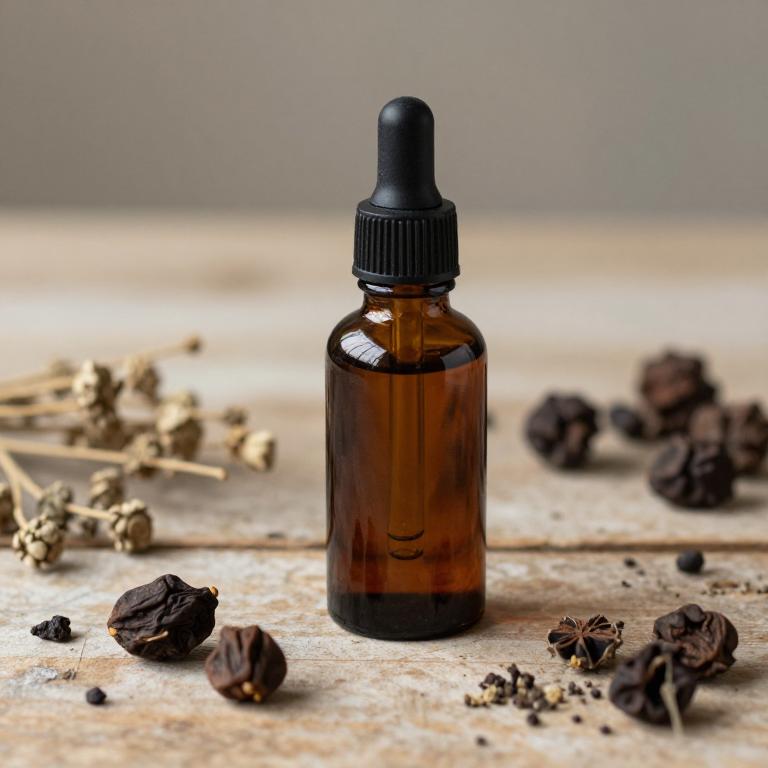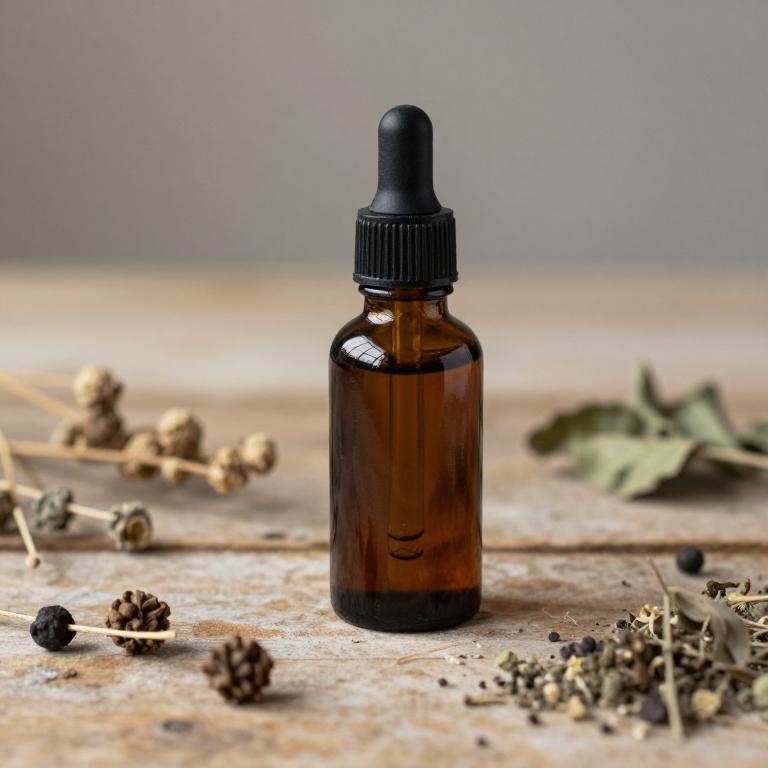10 Best Herbal Tinctures For Taste Changes

Herbal tinctures are concentrated liquid extracts made by soaking herbs in alcohol or vinegar, which can be used to alter or enhance the taste of foods and beverages.
These tinctures often contain a variety of herbs such as ginger, peppermint, licorice root, or cinnamon, each contributing unique flavor profiles. They are versatile and can be added to teas, cocktails, or even food to add depth and complexity to the overall taste. By adjusting the concentration and combination of herbs, individuals can customize the flavor to suit their preferences.
Herbal tinctures not only offer taste modification but may also provide potential health benefits due to the active compounds present in the herbs.
Table of Contents
- 1. Licorice (Glycyrrhiza glabra)
- 2. Black pepper (Piper nigrum)
- 3. Fennel (Foeniculum vulgare)
- 4. Ginger (Zingiber officinale)
- 5. Turmeric (Curcuma longa)
- 6. Rosemary (Rosmarinus officinalis)
- 7. Ceylon cinnamon (Cinnamomum verum)
- 8. Thyme (Thymus vulgaris)
- 9. Peppermint (Mentha piperita)
- 10. Echinacea (Echinacea purpurea)
1. Licorice (Glycyrrhiza glabra)

Glycyrrhiza glabra, commonly known as licorice root, is a widely used herb in traditional medicine, and its tincture form is particularly valued for its potential to support taste changes and oral health.
The tincture contains glycyrrhizin, a compound that may help balance or modify taste perception by influencing the body's hormonal and enzymatic processes. Some users report that licorice tinctures can reduce bitterness or enhance sweetness in the mouth, making them useful for those experiencing altered taste sensations due to illness or medication. It is often used in herbal formulations to support digestion and soothe the mucous membranes of the throat and mouth.
However, long-term use of licorice tinctures should be monitored due to potential side effects, including hypertension, and it is best used under the guidance of a qualified herbalist or healthcare provider.
2. Black pepper (Piper nigrum)

Piper nigrum, commonly known as black pepper, is often used in herbal tinctures to enhance taste and improve digestion.
The active compound, piperine, is responsible for the spice's ability to stimulate taste buds and increase the perception of other flavors. These tinctures can be used to add depth and complexity to culinary dishes or to support digestive health. When consumed in moderation, piper nigrum tinctures may help balance flavor profiles and promote a more vibrant taste experience.
However, it is important to consult a healthcare professional before using these tinctures, especially for individuals with sensitive stomachs or existing medical conditions.
3. Fennel (Foeniculum vulgare)

Foeniculum vulgare, commonly known as fennel, is a herb often used in the preparation of tinctures to support digestive health and promote a pleasant taste in the mouth.
These tinctures are typically made by steeping the dried seeds of the plant in alcohol, allowing the active compounds to dissolve and create a concentrated herbal solution. Fennel tinctures are known for their mild, sweet, and licorice-like flavor, which can help reduce the bitterness or unpleasant taste associated with certain foods or medications. They are often recommended for individuals experiencing digestive discomfort or those looking to enhance their overall sense of taste.
Regular use of fennel tinctures may also contribute to a more balanced and enjoyable oral sensation, supporting both taste and digestive wellness.
4. Ginger (Zingiber officinale)

Zingiber officinale, commonly known as ginger, is widely used in herbal tinctures for its potential to alter taste perception and enhance flavor profiles.
These tinctures are often prepared by steeping fresh or dried ginger root in alcohol, allowing the active compounds like gingerol and shogaol to infuse into the liquid. Some individuals use ginger tinctures to temporarily suppress bitterness or enhance the overall palatability of foods and beverages. The warming and stimulating effects of ginger may also influence taste by stimulating the oral cavity and increasing saliva production.
However, it is important to consult a healthcare professional before using ginger tinctures, as they can interact with certain medications and may not be suitable for everyone.
5. Turmeric (Curcuma longa)

Curcuma longa, commonly known as turmeric, is a widely used herbal remedy, and its tincture form offers a concentrated and easily absorbable source of curcumin, the active compound responsible for its health benefits.
Turmeric tinctures are often utilized for their potential to support digestion, reduce inflammation, and enhance overall well-being. When consumed in moderate amounts, these tinctures may contribute to subtle changes in taste perception, particularly by influencing the body's inflammatory response and gut health. Some individuals report a mild, earthy or bitter aftertaste, which is typically a normal reaction to the herb's natural properties.
However, it is important to consult with a healthcare professional before incorporating turmeric tinctures into one's routine, especially for those with existing health conditions or who are taking medications.
6. Rosemary (Rosmarinus officinalis)

Rosmarinus officinalis, commonly known as rosemary, is a versatile herb used in the preparation of herbal tinctures that can influence taste perception and enhance flavor profiles in various applications.
These tinctures are often valued for their aromatic properties, which can subtly alter the sensory experience of foods and beverages. The active compounds in rosemary, such as rosmarinic acid and essential oils, contribute to its distinctive flavor, making it a popular choice in culinary and aromatherapeutic contexts. When used in taste modification, rosemary tinctures can add a fresh, herbaceous note that complements or contrasts with other flavors.
As a natural ingredient, rosemary tinctures offer a safe and effective way to enhance or adjust the taste of products without the use of artificial additives.
7. Ceylon cinnamon (Cinnamomum verum)

Cinnamomum verum, also known as true cinnamon, is often used in herbal tinctures to provide a warm, spicy flavor profile that can enhance or modify the taste of various formulations.
These tinctures are typically made by steeping cinnamon bark in alcohol, allowing the essential oils and active compounds to infuse into the liquid. The aromatic and slightly sweet notes of cinnamon can subtly alter the flavor of foods, beverages, or even medicinal preparations. Due to its rich history in traditional medicine, cinnamon tinctures are valued not only for their taste but also for their potential health benefits.
When used in small amounts, these tinctures can add depth and complexity to a wide range of culinary and therapeutic applications.
8. Thyme (Thymus vulgaris)

Thymus vulgaris, commonly known as thyme, is a popular herb used in the preparation of herbal tinctures for its aromatic and medicinal properties.
These tinctures are often utilized to support respiratory health and can also influence taste perception due to their potent essential oils. The active compounds in thyme, such as thymol and carvacrol, may interact with taste receptors, potentially altering the perception of flavors. Some individuals report a heightened sensitivity to certain tastes or a temporary metallic aftertaste when using thyme-based tinctures.
While generally safe, it is advisable to consult a healthcare professional before use, especially for those with existing health conditions or medication regimens.
9. Peppermint (Mentha piperita)

Mentha piperita, commonly known as peppermint, is a popular herb used in the production of herbal tinctures for its refreshing and invigorating properties.
These tinctures are often used to support digestive health and can help alleviate symptoms such as bloating and indigestion. The menthol compound in peppermint tinctures can also provide a cooling sensation that may help reduce nausea and soothe throat irritation. When used in moderation, peppermint tinctures can contribute to a more balanced and pleasant sense of taste by stimulating saliva production and enhancing oral freshness.
However, individuals with certain medical conditions or those taking specific medications should consult a healthcare professional before using peppermint tinctures.
10. Echinacea (Echinacea purpurea)

Echinacea purpurea herbal tinctures are commonly used for their potential immune-boosting properties, but they can also influence taste perception in some individuals.
The active compounds in echinacea, such as alkamides and flavonoids, may interact with taste receptors or alter saliva composition, leading to temporary changes in taste. Some users report a metallic or bitter aftertaste, while others notice a more subtle, herbal flavor. These taste changes are generally mild and short-lived, though they can be unpleasant for those sensitive to herbal extracts.
It is advisable to start with a low dosage and monitor any unusual taste alterations when using echinacea tinctures.